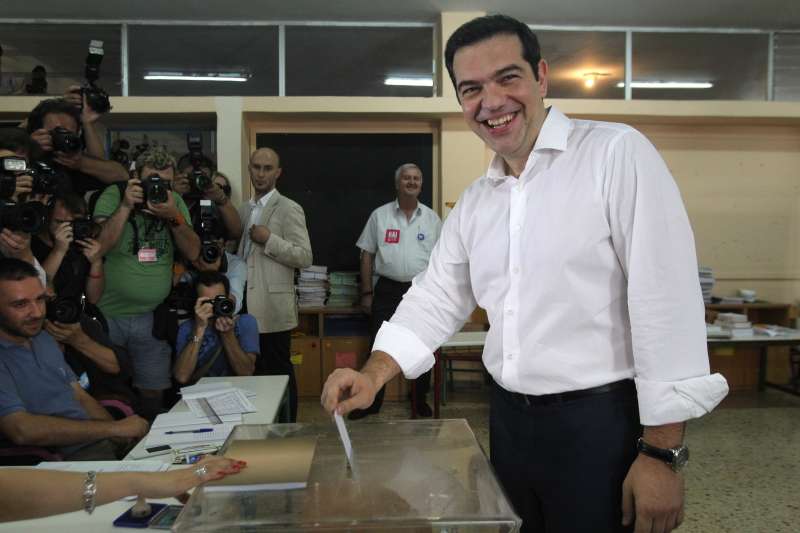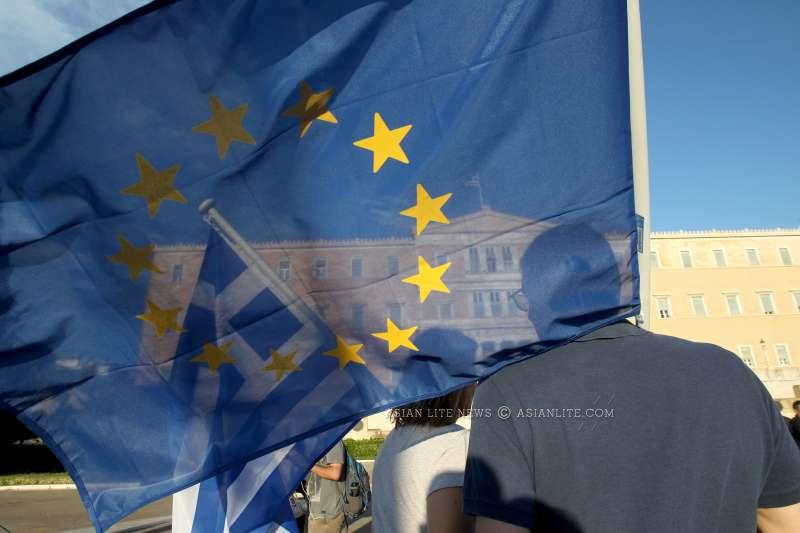Make quick ‘possible’ proposals for renegotiation: EU….reports Asian Lite News

The European Union urged the Greek government to make “meaningful” and “possible” proposals in coming hours for renegotiation, following early results which have shown that Greece overwhelmingly rejected the bloc’s bailout offer.
“The NO side has won the referendum with notable majority, we have to respect the vote of Greek people,” European Parliament President Martin Schulz said in a statement, Xinhua reported.
He argued that a “NO” vote would not entail a better deal as Greek Prime Minister Alexis Tsipras has promised to his people. “We have difficult situation,” he said.
“Greek people said NO, but 18 members of euro zone agreed about the proposals,” he said. “It is now up to Greek government to make proposals to convince the other 18 member states of euro zone and the institutions in Brussels.”
Schulz said that an immediate renegotiation was “necessary” and “possible” but depends on Greek proposals.
He also said that it seems “very difficult and dangerous” that the Greek banks could reopen on Monday and the money would be available till Tuesday, which was assured by Greek Finance Minister Yanis Varoufakis.
The Greek people said “no more” to five years of austerity, Varoufaks said in a televised address after his government triumphed.
“Greek people handed back their ultimatum… NO means YES to a democratic Europe and the EU’s vision for prosperity,” the minister said.
Greek main opposition conservative New Democracy party leader and former Prime Minister Antonis Samaras resigned after primarily results showed a strong lead of no.
According to local media, Greek negotiating team was ready to travel to Brussels and the government assured that dialogue with lenders would resume from Sunday night.
Earlier Greek ministers said that the government wanted a debt deal within 48 hours, as the country’s banking system was under unprecedented pressure.
Since last Monday Greek banks were closed and capital controls have been imposed to avert the sector’s collapse after the European emergency liquidity aid to the local banking system was cut off.
Greek officials have admitted that ATMS would run out of cash on Monday with no more financial support from creditors.
German Chancellor Angela Merkel and French President Francois Hollande were due to meet on Monday in Paris to access the outcome of referendum.
To discuss situation on Greece debt talks, leaders of the European Commission, the European Council and Eurogroup have decided to have a conference call on Monday morning and an euro summit will be convened on Tuesday.
No rift with Europe

Greek voters’ resounding “NO” to the international creditors’ debt deal offer in Sunday’s landmark referendum does not mean a rift with Europe, but a “YES” to a viable agreement, Greek Prime Minister Alexis Tsipras said in a televised address.
Greek citizens rejected the lenders June 25 proposal for a reforms-for-cash deal with 61.5 percent of votes against 38.5 percent, with 88 percent of the votes counted, according to the latest data released by the Interior Ministry. Voters’ participation exceeded the 61 percent.
The outcome may determine whether Greece would remain afloat and in the euro zone with creditors’ further assistance or head to a disorderly default and possible Grexit should lenders interpret it as NO to Europe, as officials and analysts in Greece and across the world have warned.
“I know well that NO, your mandate, is not for a break with Europe, but for the achievement of a sustainable debt deal with no waste of time,” the Leftist Premier said on Sunday night, sticking to his government’s argument ahead of the referendum that a sound NO would boost their negotiating position in talks with lenders as of Monday.
“The question was not inside or outside the euro, but what kind of Europe Greeks wanted,” Tsipras stressed, adding that Greek people sent a message in favor of “a Europe of solidarity and democracy.
The Greek government’s first priorities after the referendum’s results was to seek the resumption of negotiations with lenders, requesting a debt relief to make the Greek debt load sustainable, and restore stability in the banking sector, he said.
Greece’s banking system was teetering at the brink of collapse since the European emergency liquidity aid (ELA) was freezed last weekend after his shock call for the referendum and as negotiations continued for five months.
In a bid to heal the wounds opened in recent days in Greek society which was divided between the NO and YES, the Greek leader made a plea for national unity to prevail as of Monday.
He said he would ask the President of the Greek Republic Prokopis Pavlopoulos to call a meeting of the Council of the leaders of all political parties represented in parliament in coming hours to exchange views on the next steps the country should take.
Main opposition conservative New Democracy (ND) party leader and former Prime Minister Antonis Samaras who backed the YES resigned on Sunday evening.
“The referendum does not have winners and losers…. From now on we are all united,” Tsipras underlined, urging Greeks to work hard to restore social cohesion and thanking the European citizens who showed solidarity with Greek people.
Thousands of supporters of the NO and the ruling two-partite coalition government of the Radical Left SYRIZA and the Right- wing Independent Greeks took to the streets of Athens in front of the parliament to celebrate the victory.
However, proponents of the YES and analysts drew caution to the possible reactions of lenders and the impact on the Greek economy and society.
As an emergency euro zone summit and Euro Group were expected to be convened later this week, opposition parties leaders, media commentators and financial experts feared that the “mutually beneficial” deal the government expected to be sealed within 48 hours -and the reopening of banks on Tuesday- would take much more time- if achieved.
Without an urgent liquidity injection from ELA Greek cabinet ministers and bankers have admitted that ATMs will run out of cash by Tuesday, despite the capital controls introduced since last Monday.
Without the safety net of the bailout program that kept it afloat over the past five years that expired on June 30 and in arrears status to International Monetary Fund from the same day, should Tsipras’ government fails to reach a “viable” deal soon, Greece could be led to a nightmarish default and possible exit from the euro zone shortly, analysts warned.